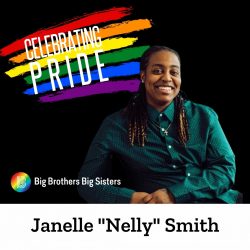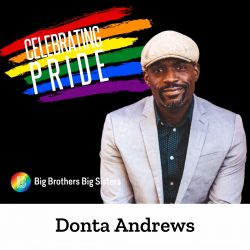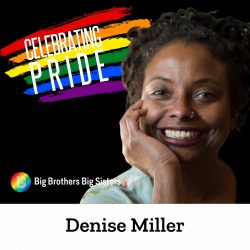Celebrating Pride: Maggie Adams
Big Brothers Big Sisters of Southwest Michigan is proud to celebrate Local Pride throughout June. Sign up for our e.news to get updates in your inbox and learn more about Pride in your community.
“Queer people don’t grow up as ourselves, we grow up playing a version of ourselves that sacrifices authenticity to minimize humiliation & prejudice.” —Alexander Leon
Imagine talking superficially about yourself for over 50 years to the point that you lose track of your true self.
MY YOUNGER SELF
Today I am 60 years old, a non-binary genderqueer. Years ago I unknowingly created a person who stood in for me, keeping me safe at the sacrifice of me growing authentically. I had a double, a twin that played me when out in public, in my profession, with family, and friends. Somewhere along the way I accepted what I thought was my true self. Growing up in the 60’s and 70’s, my yearning to understand who I was turned into learning to silence any aspect of me that didn’t seem to fit into societal ‘norms.’
FOLX
There was little to no visibility for folx like me. I had heard of terms like gay, lesbian and transvestite. Words used to not describe folx who were identified by gender or sexual orientation but folx who were described as deviants and not ‘normal’.
I didn’t want to be gay, lesbian, queer or anything considered deviant. I wanted to be ‘normal.’ I was scared to think I had any tendency to what folx called homosexuality. There were laws against homosexuality. Religion said you were an abomination and would go to hell. Liking someone of the same sex was also considered a psychiatric disorder. The innocence of discovering my truth in my youth vanished quickly.
ELEMENTARY SCHOOL
I remember some discomfort in my body when my mother would put me in a dress and curl my hair. I cried a lot in elementary school. I didn’t know how to name how I was feeling then. I often was told I was being uncooperative and punished for not doing as I was directed. Children should be seen and not heard. My parents meant well. They were only operating from what they knew about raising a kid in the 60’s and 70’s.The term gender back then was considered the same as your sex assigned at birth. Hence society expected you to express yourself accordingly. And so my theatrical performance began before I even knew what a thespian was.
MIDDLE SCHOOL
In middle school I buried myself in my academics, music and sports, excelling in all of them. A boy gave me some attention and I kept waiting to feel what other girls felt. If I was ‘normal’ then I should have some attraction to him. I did like him. I was not attracted to him and I tried hard to be ‘normal.’ He could be cruel. The message I got was I wasn’t pretty enough. I was too smart and he was mad I was a better athlete. I had short hair and often was called boy, sir or tomboy. These comments were meant to be hurtful, reflecting that how I was expressing myself was not in the ‘norm’. And I started to groom my character, my double. She grew her hair out, was quiet and kept to herself.
HIGH SCHOOL
By the time I was in high school I knew I was attracted to girls and I preferred to dress gender neutral. This seemed so natural. There were no role models or figures in the public to look to for reassurance of how I was feeling and desiring to express in my attire. If anything you saw over generalizations of gay or lesbian folx. Boys were called fags and girls dykes. So what felt natural again was not considered ‘normal’. I did begin to glimpse other folx that may have felt like me. They expressed themselves mostly though in playful flirtatious ways.
Then I met someone and as I look back, we were in love. I never acknowledged how I felt as I was unsure. Her mother limited our friendship and said we were too close and accused me of being a lesbian. I was scared, confused and I added a dimension to my character who avoided humiliation at all costs. My double dated a boy and ignored the friend. This was safe.
COLLEGE
I started college in the fall of 1979. I actually met other folx who were attracted to women. I was intrigued. I had my first relationship with a woman. In my head I thought that it was just a phase. Something that was going to pass. At some point, I would find this attraction that I was supposed to have for men so I could be ‘normal’. I’d tell myself and others that I was attracted to men and women. I did like men and actually worked and got along with men very well. Now my character was bi-sexual. Safe.
I desperately wanted to talk to someone and told a high school friend I thought I was gay. She quoted something from the bible, told me I’d go to hell and never talked to me again. When my relationship ended I was not equipped to handle the emotional despair. I was suicidal. I was confused. I had not developed a good sense of self growing up and struggled with depending on others for feeling loved.
CAREER
My career was in education. I was blessed to teach hundreds of youth. I am so happy today that young people can be out and be themselves and not endure what many of us older LGBTQ folx did. Many of us felt forced to live in binary hetero social constructs with little hope to marry, adopt children or express ourselves that were not bounded by perceived gender norms. The stigma and discrimination kept me well hidden in my double for years.
Now I have retired from 37 years in education and I have retired the ‘double’ version of myself I created to keep me safe. My role now is to understand what parts of me are truly me and what parts of me were created to shield me from harm. This feels so freeing. And I am enjoying exploring what my style is as a non-binary genderqueer.
AUTHENTICITY
I want all kids to feel free and authentic in their identity and expressions and that this is ‘normal’. The fact that kids can now hope to marry, adopt and express themselves, beyond binary and other social constructs, is something I never thought would be possible in my lifetime. I love that inclusivity now includes educating ourselves in understanding the difference between gender and sexual orientation. The visibility is growing and glowing!
And I hope one day there is no such thing as ‘coming out’. That ‘normal’ is young kids feeling valid and accepted in their experiences which includes, exploring and questioning their gender and sexuality, free to express their truth throughout their lives!`
It is not your responsibility to be a version of yourself that you don’t resonate with anymore just because people are more comfortable with who you used to be. You don’t have to take steps back in your growth, or relive what you’ve outgrown, just to keep certain connections alive.



